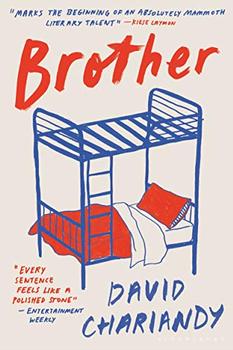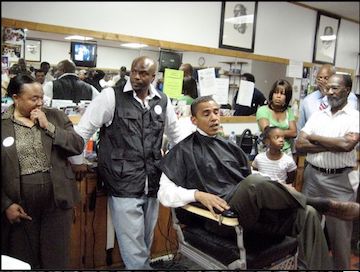Summary | Excerpt | Reading Guide | Reviews | Beyond the Book | Read-Alikes | Genres & Themes | Author Bio

This article relates to Brother
 As a young teen, Michael (in David Chariandy's Brother) begins spending time at the neighborhood barbershop, Desirea's, with his older brother and his friends. In the book, just as in life, black men visit the barbershop not just for haircuts, but to share their personal lives, discuss current events, listen to music and just relax with their neighbors and friends.
As a young teen, Michael (in David Chariandy's Brother) begins spending time at the neighborhood barbershop, Desirea's, with his older brother and his friends. In the book, just as in life, black men visit the barbershop not just for haircuts, but to share their personal lives, discuss current events, listen to music and just relax with their neighbors and friends.
In an ode to the barbershop published in Fader magazine, a journalist quotes a friend: "In a lot of ways barbers are our therapists. The shop is where I learned what being a black man was about early on," adding that there are "not many places that all men got together and could talk freely." Fader also published interviews with five black barbers from across the United States to gather their thoughts on the barbershop as a place of community and togetherness where men can exchange ideas. One barber explained that his shop is a place "where all types and ages of people [come] together to have an open dialog and growth," while another highlighted the importance of his role in his patrons' lives: "People trust me for their image in life, for the moment. I'm needed for several reasons and I'm a part of the process in all of them: first day of school, interview, job, wedding or date...It serves as a place of balance."
 A journalist for the Black Youth Project, however, points out the ways in which the barbershop can be a breeding ground for toxic masculinity – for example, the sharing of sexist and homophobic viewpoints. While acknowledging that it can be a place to "heal and to love," he points out that this opportunity is usually restricted to heterosexual and cisgender men. Openly gay former NFL player Wade Davis spoke with the Huffington Post about his unique experience of being accepted at his barbershop; being "the 'gay football guy' in the shop has allowed customers to discuss everything from Frank Ocean to sexism and misogyny, to HIV in the black community, to the prison-industrial complex." In Brother, it is strongly implied that Francis and his best friend Jelly have an intimate relationship, though it is not stated outright, and if it is noticed by the boys' other friends at Desirea's, no one mentions it.
A journalist for the Black Youth Project, however, points out the ways in which the barbershop can be a breeding ground for toxic masculinity – for example, the sharing of sexist and homophobic viewpoints. While acknowledging that it can be a place to "heal and to love," he points out that this opportunity is usually restricted to heterosexual and cisgender men. Openly gay former NFL player Wade Davis spoke with the Huffington Post about his unique experience of being accepted at his barbershop; being "the 'gay football guy' in the shop has allowed customers to discuss everything from Frank Ocean to sexism and misogyny, to HIV in the black community, to the prison-industrial complex." In Brother, it is strongly implied that Francis and his best friend Jelly have an intimate relationship, though it is not stated outright, and if it is noticed by the boys' other friends at Desirea's, no one mentions it.
 Recently, healthcare researchers have begun reaching out to men at barbershops about medical issues like the importance of screening for hypertension and prostate cancer. Research shows that many men are reluctant to seek out routine medical treatment, sometimes because of a distrust for doctors, sometimes because of lack of time or money. In an experiment spearheaded by the New England Journal of Medicine, researchers went directly to the barbershop, where most black men go on a regular basis anyway, and conducted the tests there. During the screening, the researchers provided advice about methods for lowering blood pressure, and found that that men were more open to receiving this information in an informal setting where they felt at ease.
Recently, healthcare researchers have begun reaching out to men at barbershops about medical issues like the importance of screening for hypertension and prostate cancer. Research shows that many men are reluctant to seek out routine medical treatment, sometimes because of a distrust for doctors, sometimes because of lack of time or money. In an experiment spearheaded by the New England Journal of Medicine, researchers went directly to the barbershop, where most black men go on a regular basis anyway, and conducted the tests there. During the screening, the researchers provided advice about methods for lowering blood pressure, and found that that men were more open to receiving this information in an informal setting where they felt at ease.
Barbershop, courtesy of plushstylephoto.com
Obama at the barbershop, courtesy of themancavebarberlounge.com
ASU professor Olga Idriss Davis checks the blood pressure of barber Marvin Davis, courtesy of asunow.casu.edu
Filed under Places, Cultures & Identities
![]() This "beyond the book article" relates to Brother. It originally ran in August 2018 and has been updated for the
November 2019 paperback edition.
Go to magazine.
This "beyond the book article" relates to Brother. It originally ran in August 2018 and has been updated for the
November 2019 paperback edition.
Go to magazine.
Your guide toexceptional books
BookBrowse seeks out and recommends the best in contemporary fiction and nonfiction—books that not only engage and entertain but also deepen our understanding of ourselves and the world around us.